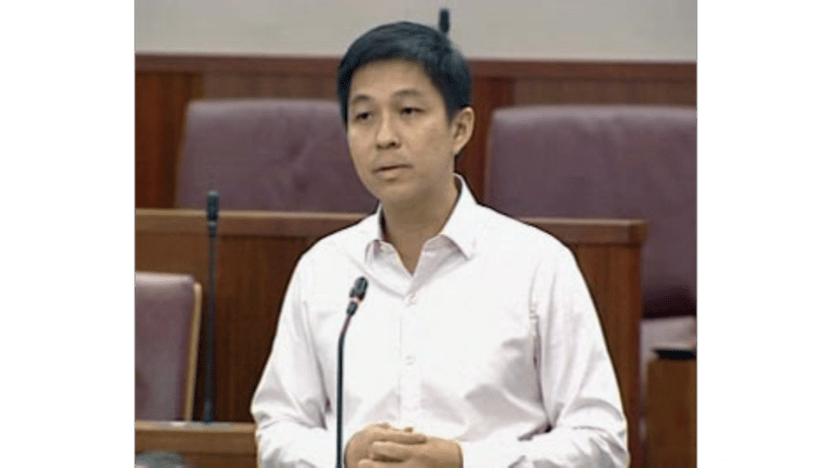Comprehensive, active strategy needed to help low-income families
Minister of State for Manpower Tan Chuan-Jin said what's needed is a comprehensive and active strategy to help low-income families improve their overall quality of life and share in Singapore's continued progress.

Mr Tan Chuan-Jin speaking in Parliament (file picture)
SINGAPORE: Parliament on Monday discussed the "shock therapy" proposed by former National Wages Council chairman Lim Chong Yah to improve the wages of low-income workers.
On May Day during a wide-ranging speech, Prime Minister Lee Hsien Loong had commented on the proposal and said he disagreed with Professor Lim's idea to raise the wages of lower-income workers by pushing up the wages of low-wage workers rapidly by 50 percent in three years.
Mr Lee emphasised that the only realistic way is to move step by step with wage and productivity moving up together.
He warned that sharp wage increases without a corresponding productivity improvement will make low-wage workers worse off.
Giving a full reply on Monday in Parliament, Minister of State for Manpower Tan Chuan-Jin said what's needed is a comprehensive and active strategy to help low-income families improve their overall quality of life and share in Singapore's continued progress.
Mr Tan said: "Helping lower-income workers and their families is not confined to jobs alone. We have enhanced our housing grants and subsidies to help lower-income families own their own homes and this has enabled many of my residents to either own their own flats or rent at below-market rentals.
"We have also expanded education subsidies and programmes to give their children a leg up in education. We have improved access to affordable healthcare, including long term care for the aged.
"In this year's Budget, we introduced further, major initiatives, to take us forward in building an inclusive Singapore. On the ground, all of us can see how these various efforts can impact on the lives of those who fall under the lower income bracket."
Replying to four questions raised by MPs on the subject, he explained that wages at the lower end have in fact picked up significantly over the past five years for most lower-wage workers.
Adjusting for inflation, the real incomes of Singaporean workers at the 20th percentile grew by 11.5 percent, or 2.2 percent per annum from 2006 to last year.
Turning to Singaporean households at the 20th percentile, Mr Tan added that household income per member grew by 13.6 percent in real terms in the last five years.
Last year, those in the bottom 20 percent in fact saw the highest percentage growth in income per member.
Mr Tan said: "This improvement at the household level reflected not just the rise in individual wages in the last five years, but also the fact that more members of the household have found employment in an economy that has created many new jobs.
"It is also worth recognising that this significant growth in incomes in the last five years occurred despite the rise in the proportion of foreign workers in the workforce."
However, Mr Tan added that while the broad group of lower-income workers has seen better real incomes, some Singaporeans in specific low-wage occupations have not experienced this improvement in incomes, like office cleaners who are amongst the lowest paid in the workforce.
Mr Tan outlined three strategies to raise wages.
First, Singapore has seen that the incomes of lower-wage workers are badly affected when the economy falls into recession or does poorly.
So, the country has to ensure that it recovers quickly each time the economy takes a dip.
Secondly, Singapore must invest in and continuously improve the productivity, innovation and skills of companies and workers.
Mr Tan warned that without significant productivity improvements in the next decade, the nation will not be able to improve incomes significantly and on a sustained basis for Singaporeans.
The third strategy is to ensure that lower-wage workers in particular benefit from growth.
Mr Tan said: "To summarise, we are addressing the problem of low-wage through a multi-pronged approach. First, broad-based approaches to improve productivity, skills and incomes; and second, targeted approaches that address issues specific to certain sectors.
"Not just economy-wide incentives, but industry by industry, company by company, working on a tripartite basis to put in place concrete plans to restructure companies' operations, upgrade jobs and tie in wage gains with productivity improvements."
Mr Tan stressed that while the government will do its part, it will also work with business owners, and unions and workers to ensure the country makes real progress so that all Singaporeans, especially lower-wage workers, can look forward to better jobs and higher incomes.
However, opposition MP Sylvia Lim pointed out that the links between productivity and wages at the sectoral levels are weak.
She said: "In particular, there was a report put up by MTI in 2011, which mentioned certain sectors where there have been productivity gains for example in electronics but the wage gains were not apparently moving in tandem."
Mr Tan replied: "At the macro level, indeed, we have found that the level of productivity increases over the last decade has moved roughly in sync with wages but Ms Sylvia Lim is also correct to say that there are variations within sectors and this is something we need to look out for."











